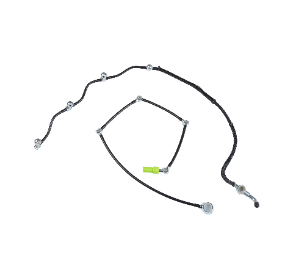In Low-Pressure Oil Pipe, operating pressure, flow rate and oil type will significantly affect the operating efficiency, stability and service life of the system. Let’s discuss how these three factors affect system performance:
work pressure
Affects the sealing and safety of the system: The design of low-pressure oil pipes usually takes into account a specific working pressure range. Pressure that is too high or too low may cause the system to operate erratically. If the pressure is too high, it may exceed the bearing range of pipelines and other components, causing leakage or damage; if the pressure is too low, it may not be able to provide sufficient power or cause poor oil flow.
Impact on energy efficiency: Under appropriate working pressure, the system can operate at optimal energy efficiency. Too high working pressure will lead to energy waste, and too low pressure may lead to insufficient flow and affect equipment performance.
flow
Affects system response speed: The flow rate directly determines the speed of oil delivery and affects the response time of actuators (such as hydraulic cylinders and motors). If the flow rate is insufficient, the actuator may act sluggishly and the system response may also be slow; if the flow rate is too large, it may cause excessively violent actions and increase the burden on the system.

Affects load capacity and stability: Traffic size is also closely related to the load capacity of the system. Too high a flow rate may cause the oil in the pipeline to flow violently, causing vibration and noise, while a too low flow rate may cause the load to be insufficiently supplied, resulting in unstable system operation.
Oil type
Affects lubrication effect and equipment life: Different types of oil have different viscosities, lubricity and high temperature resistance. The appropriate type of oil can ensure good lubrication between components in the system, reduce wear and extend the service life of the equipment. If the oil type is inappropriate, it may result in poor lubrication and damage to components.
Affects the operating temperature of the system: The viscosity of the oil directly affects its fluidity. Fluids with too high a viscosity may cause the system to overheat during operation, while fluids with too low a viscosity may cause insufficient lubrication. Proper selection of fluid type can help control operating temperatures and ensure stable system operation.
Comprehensive impact:
These factors are interconnected, and the right combination of pressure, flow, and fluid type can improve system efficiency and reliability. If one of the parameters is inappropriate, it may lead to reduced efficiency, component damage or even system failure. Therefore, when designing and maintaining low-pressure oil piping systems, these factors need to be considered comprehensively to achieve optimal system performance.

 English
English Español
Español русский
русский












